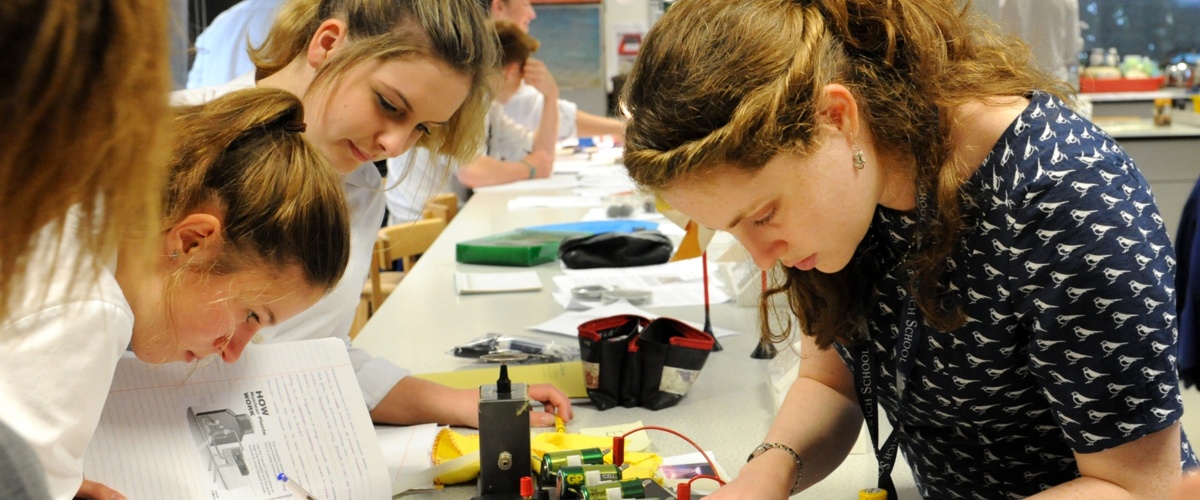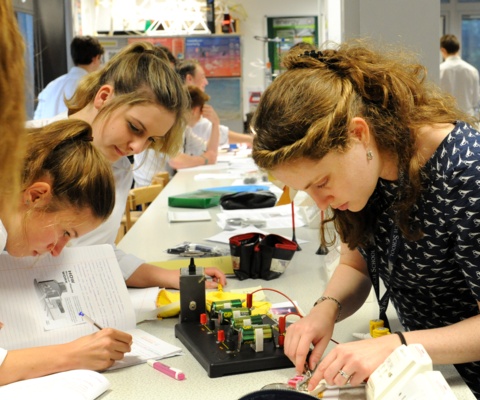Physics


Physics is the study of the universe, including the objects within it and the interactions between those objects.
In the Physics Department, we begin by inspiring pupils with a sense of wonder and curiosity about natural phenomena, then show how an understanding of the physical world enables science to create wonders of its own.
In pursuing these aims, we encourage pupils to think, to question, to investigate, to plan, to experiment, to calculate and to communicate.
We enjoy excellent laboratory facilities, skilled and experienced technician and a dedicated teaching staff, all of whom have physics-related degrees.
The subject is a springboard to a huge variety of careers and university degrees. Engineering is a popular choice and the analytical and communication skills that pupils develop during the course equips them for almost any career, including finance, computing, law and medicine.
4th Form
In Lower 4, pupils study magnets, stars & planets, practical circuits, and heat. These topics contain plenty that appeals to pupils of this age! We do not expect pupils at this age to memorise a lot of new facts; instead, the focus is on experiment and scientific thinking. Pupils gradually acquire confidence in the laboratory, and develop habits of safe and accurate measurement.
This year's Upper 4 cohort will cover the detection of sound (by the ear and by microphones), the detection of light (by the eye and by LDRs and other devices), what's in an atom, floating and sinking, independent research into either 21st-century materials or astrophysics, and energy in electric circuits. Here there is a little more factual content but also a more rigorous approach to experimentation, with a focus on instruments and good techniques.
5th Form
These three years are when pupils acquire the detailed knowledge and experience needed for them to select the best A level courses for them, to continue successfully to A level study if they decide to take A level Physics, and to act as informed contributors to society if they stop studying Physics at age 16.
The three years include plenty of exciting and challenging science like electromagnetism, nuclear physics, and the behaviour of gases, and the Fifth Form culminates in the Edexcel International GCSE examination.
This year's Upper 5 is the last cohort who will be awarded grades A*-E in their science GCSEs. The Middle 5 and Lower 5 have a new, slightly expanded specification and will be awarded grades 9 - 1.
6th Form
Click here to view the A Level Physics subject information.
At A-Level we follow the OCR A Physics course.
In Lower Six, pupils will study the fundamentals of mechanics, electric circuits and waves, while we also introduce the intriguing and counter-intuitive world of Quantum Mechanics.
In Upper Six, pupils encounter electric and magnetic fields, capacitors and simple harmonic motion. However, they also explore nuclear physics, astrophysics, and diagnostic and treatment techniques in medicine. The course has recently been augmented with the latest ideas concerning dark matter and particle physics.
Pupils are expected to display competent and capable research skills and to keep a laboratory book as part of their evidence towards the Practical Endorsement.
